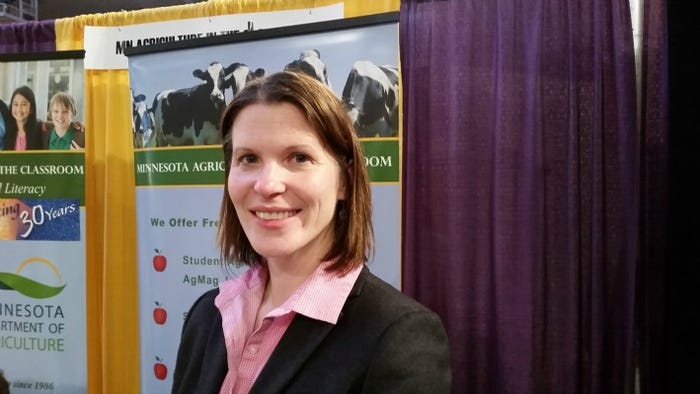
At Ag Expo in Mankato, we heard more than once about the importance of farmers contributing to discussions about food production and agriculture.
With all the interest in food, and the various opinions on production methods, food ingredients, labels, etc., farmers are in a unique position to explain what they do and why.
“You are a celebrity in your community,” said Sue Knott, education specialist with Minnesota Ag in the Classroom. “People want to know you and what you do.” MAITC’s mission is to promote ag literacy across the state. It offers high-quality K-12 educational materials that meet state learning standards for free to teachers.

Advocate and educate. Sue Knott, Minnesota Ag in the Classroom, encourages more farmers to contact their schools and boost ag literacy.
Knott encouraged farmers to take advantage of their celebrity status, and advocate and educate for agriculture. Specifically, she offered some excellent ideas of how farmers could engage a younger audience in subjects related to farming. One quick lesson focused on dissecting a soybean seed to learn what was inside. She passed around soybeans soaked in water and instructed us to rub off the seed coating and then splice the seed in half. The coating is like our skin, she said, protecting us. And then after we popped them open, she told us about the parts of the seed and their importance.
Another quick lesson involved sorting plants, which complements a book entitled “Tops and Bottoms.” As Sue held up various edible fruits and vegetables, she asked us to categorize them as root, stem, leaves, flower or fruit. The easy ones were carrot, root; lettuce, leaves; celery, stem; broccoli, flower. As she held up a green pepper, I thought it might be a fruit. It is. But sweet corn? Yes, that’s a fruit. Fruits have seeds inside, she said.
Sue also gave an overview of what MAITC provides [check out the website: http://www.mda.state.mn.us/kids.aspx] and then she gave us some suggestions:
-Connect with teachers in your community. Ask them if they know about Ag in the Classroom. If not, tell them about the free materials—AgMag, for grades 4-6, and AgMag Jr., for grades K-2.
-Ask if you could visit their classrooms to talk about your farm and how you care for animals and the environment.
-Donate a ‘Book Bundle’ to a local school. MAITC has already done the work in reviewing and ‘bundling’ two packages of books specifically for elementary schools, grades K-2 and grades 3-5. Each ‘bundle’ contains 10 books and costs $100 each. Coordinate with your local FFA chapter or farm commodity group to see if you could obtain funds to pay for these donations.
An “Advocacy for Ag” panel later at Ag Expo offered some good suggestions, too, as well as compelling reasons for more farmers to speak up.
-Start a conversation with your circle of friends. They might know you’re a farmer, but not what you actually do on a daily basis. Invite them to your farm.
-Add advocacy to your farm’s business management plan and do that now. According to panelist Pam Johnson, a farmer from Floyd County, Iowa, advocacy is every farmer’s responsibility.
“It is hard work. You have to market yourself and what you do,” she said. “You’ve got to lift your head up, move beyond the farm gate and go. And don’t stop because you don’t think you’re not good enough... It is a must-do, it’s not optional. Especially now with prices going down, don’t be mad and apathetic. Do something!”
--Build trust by building relationships. One group that does this effectively is CommonGround Minnesota, a small group of women located across the state that volunteer to have ongoing, friendly conversations with female consumers about all things farming. Visit their Facebook page to learn more about them. Or visit the organization’s website at http://findourcommonground.com/
-If negative news appears on the front page of your local paper, call and ask to meet with the editorial board or editor to discuss your views. Invite them to tour your farm.
As is often said, if you are not at the table, you are on the menu.
So claim your seat. Listen. And then start sharing what you know.
About the Author(s)
You May Also Like






